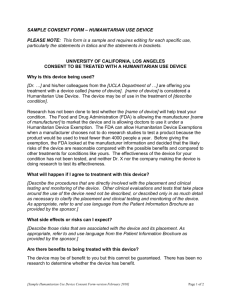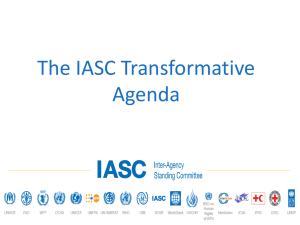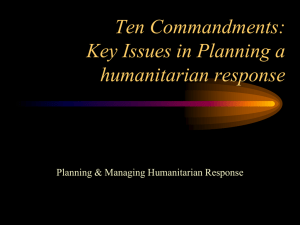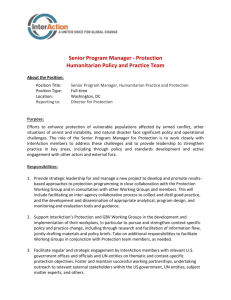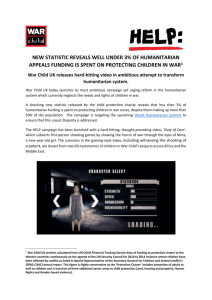Advanced Diploma in Humanitarian Programme
advertisement
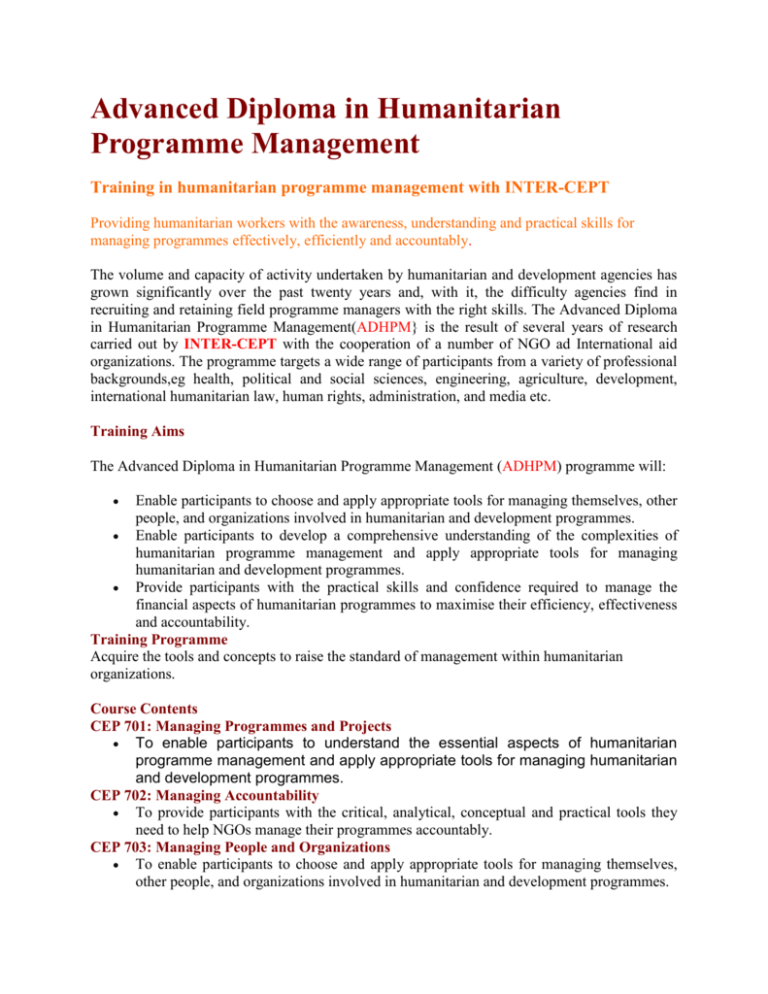
Advanced Diploma in Humanitarian Programme Management Training in humanitarian programme management with INTER-CEPT Providing humanitarian workers with the awareness, understanding and practical skills for managing programmes effectively, efficiently and accountably. The volume and capacity of activity undertaken by humanitarian and development agencies has grown significantly over the past twenty years and, with it, the difficulty agencies find in recruiting and retaining field programme managers with the right skills. The Advanced Diploma in Humanitarian Programme Management(ADHPM} is the result of several years of research carried out by INTER-CEPT with the cooperation of a number of NGO ad International aid organizations. The programme targets a wide range of participants from a variety of professional backgrounds,eg health, political and social sciences, engineering, agriculture, development, international humanitarian law, human rights, administration, and media etc. Training Aims The Advanced Diploma in Humanitarian Programme Management (ADHPM) programme will: Enable participants to choose and apply appropriate tools for managing themselves, other people, and organizations involved in humanitarian and development programmes. Enable participants to develop a comprehensive understanding of the complexities of humanitarian programme management and apply appropriate tools for managing humanitarian and development programmes. Provide participants with the practical skills and confidence required to manage the financial aspects of humanitarian programmes to maximise their efficiency, effectiveness and accountability. Training Programme Acquire the tools and concepts to raise the standard of management within humanitarian organizations. Course Contents CEP 701: Managing Programmes and Projects To enable participants to understand the essential aspects of humanitarian programme management and apply appropriate tools for managing humanitarian and development programmes. CEP 702: Managing Accountability To provide participants with the critical, analytical, conceptual and practical tools they need to help NGOs manage their programmes accountably. CEP 703: Managing People and Organizations To enable participants to choose and apply appropriate tools for managing themselves, other people, and organizations involved in humanitarian and development programmes. CEP 704: Practical Financing Management for Humanitarian and Development NGOs To provide participants with the practical skills and confidence required to manage the financial aspects of humanitarian programmes to maximize their efficiency, effectiveness and accountability. CEP 705: Fundraising To provide participants with the critical practical skills to raise funds for humanitarian and development programmes from donor agencies, the corporate sector and the general public. CEP 706: Research Methods for Humanitarian Programmes To provide an understanding of research methods. To facilitate the writing of the student’s dissertation. To provide an understanding of research methods which can be applied in the field for humanitarian assistance and development. To emphasize the importance of an ethical approach to research Specialist Option: CEP 707: Health in Emergencies CEP 708: Technical Support Public Health and Communicable Logistics;Environmental Disease Control; Health; Food and Nutrition; Reproductive Water and Sanitation; Health; HIV/AIDS;Sexual violence; Torture; Vector Control; Communications. Mental Health. CEP 709: Policy and advocacy Political analysis of complex emergencies; Practical application of IHL; Humanitarian interventions and the Media. Research Project The programme offers participants an opportunity to develop and undertake a research project in an area of special interest. Assessments The assessment systems used will vary widely depending on the subject matter. Assessment methods include integrated continuous assessment, assignments, and end of module / semester examinations. There will be few exams and much report-writing combined with continuous assessment. Requirements Minimum two years’ experience, some of which must be at a managerial level, in the humanitarian field, or, exceptionally, in the for-profit sector However, participants will be considered for admission if they have relevant field experience or either a diploma from Inter-Cept or a Diploma in Humanitarian Program Management from any recognized institution Course Fee : $ 1850 (for the entire course) Course Duration : Minimum Duration: 1 Year. Maximum Duration: 2Years





